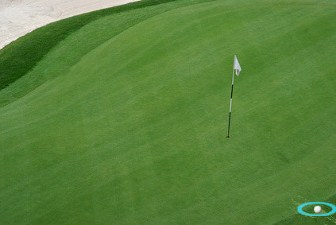
“Bermuda grass” is a type of warm-season grass commonly used on golf courses, particularly in areas with warm climates. It is named after the island of Bermuda where the grass is native. Bermuda grass is known for its resilience, durability, and ability to withstand high temperatures and drought conditions.
On golf courses, Bermuda grass is commonly found on fairways, tees, and roughs. It is valued for its ability to handle heavy foot traffic and recover quickly from damage, making it suitable for areas that receive a lot of play. Bermuda grass can also provide good ball lies and allow the golf ball to sit up nicely, which can be advantageous for approach shots from the fairway.
Bermuda grass has a medium to fine texture and can create a dense and uniform turf. It has a rapid growth rate, particularly in warmer months, and requires regular mowing to maintain an appropriate height. Golf course maintenance practices for Bermuda grass may involve frequent mowing, fertilization, irrigation, and weed control to ensure optimal playing conditions.
While Bermuda grass is well-suited for warm climates, it can become dormant and turn brown during colder months. In regions with colder winters, golf courses may overseed the Bermuda grass with cool-season grasses, such as ryegrass, to maintain green playing surfaces throughout the year.
The characteristics and maintenance requirements of Bermuda grass make it a popular choice for golf course fairways and other areas that experience heavy use. Its ability to tolerate heat, recover from damage, and provide good playing conditions contribute to the overall quality of the golfing experience.
Bermuda Grass, Golf Term:Grass strain very common in the U.S. Sunbelt, Australia and other regions with hot climates. Bermuda is used for tees, fairways, rough and greens, with different varieties favored for fairways and greens.





